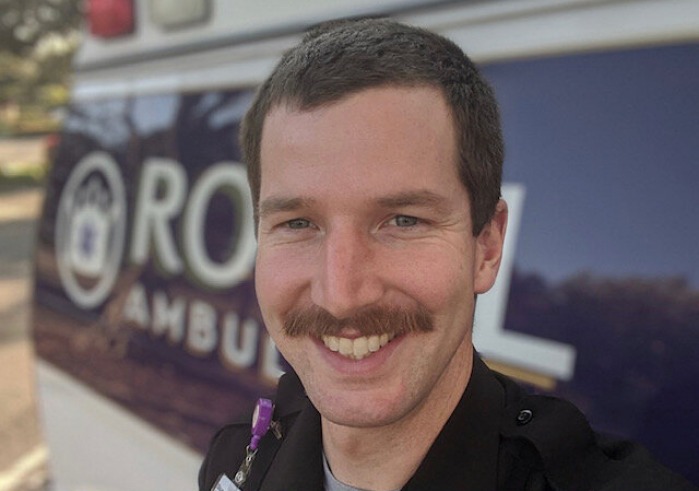Committed to Serve: Stuart Adams ’16 Finds Purpose in the Line of Fire

For 56 days in a row last fall, Stuart Adams ’16 met the other members of his crew at base camp, ate a quick breakfast, grabbed a sack lunch, donned his PPE, and headed to the fire lines.
On one of those days in September, as the North Complex Fire tore through forests north of Sacramento, Adams’ crew cleared brush to create a buffer lane to stop the approaching flames. They lit a fire to burn out a section of terrain in front of them, a standard firefighting practice. But the wind picked up and the fire grew quickly—so quickly that Adams and the rest of the crew had to race out of danger.
It was one of the most challenging days Adams has experienced since he joined the California Department of Fire Protection (CalFire) in July, a few months before the start of the worst wildfire season in California history.
At first glance, firefighting seems an unusual occupation for someone who entered SUA with the overarching goal of preparing for a career that brings more peace to the world. Adams doesn’t see it that way. “Peace is not a term that relates to the absence of warfare, but an active word,” he said. “I always knew I wanted to be a public servant.”
Adams, who grew up in Albany, Calif., a town on the San Francisco Bay, didn’t have a concrete career goal when he was applying to college. He did know that whatever path he would follow would need to contribute to a more peaceful world. That led him to Soka. “I knew SUA’s liberal arts education,” he said, “would give me the base I needed no matter what I did.”
Once on campus, Adams began to focus on a career in international relations, politics, or activism. Seeing the “nastiness and vitriol in electoral politics,” during the 2016 presidential election changed his mind. Adams had taken an emergency management Learning Cluster at SUA but hadn’t thought much more about it until after he’d graduated, while working at an unsatisfying job in finance. Helping people in times during natural or manmade disasters would allow him to be the kind of public servant he aspired to become: one who served others without regard to their beliefs, socioeconomic status, race, ethnicity, or anything else that can cause division.
Adams enrolled in an EMT program that included training in firefighting. Things began to click into place. “The fire service really serves as the backbone for emergency response in the US,” he said. “I really have a lot of respect for people who work on the front lines.”
While working part-time as an EMT on an ambulance crew, he attended the fire academy. Adams isn’t joking when he says he “knew from my whole experience at SUA that I could handle the fire academy.”
“When I was doing my capstone, I had really struggled because I had delayed getting started,” he said. “I had to learn time management to get it done while keeping up with my extracurricular activities, because I was involved in multiple things. The skills I developed then taught me how to look at the situation in front of me and determine what I can do right now to complete a task, and not get overwhelmed.”
He was working 40 hours a week as an EMT while completing the academy in March when the pandemic broke out. Adams marshalled the determination he’d developed in college.
“While I was in the fire academy, nobody who knew me saw me,” he said. “I was always working. I had to remind myself how much I wanted it. What I learned this year is that the peace we aspire to may not happen. It is not guaranteed. Because SUA aspires to create it, they do not play around. You need to have that strength of conviction, even when circumstances seem dire.”
On days like the one he experienced in September, his training as a firefighter gives him the confidence he needs. “We are taught how to act in situations that are unsafe,” he said. “But it is not everyday you encounter them, so you can’t get that kind of practice. You have to train and study them.”
During his rookie year with CalFire, the crew’s camaraderie, and a good dose of gallows humor, kept Adams going on long days. CalFire is diverse and egalitarian, he says, and he appreciates the firefighters’ shared commitment to their jobs. “I have really good relationships with people I work with,” he said. “You have to have imaginative empathy for everyone. Not just the people who are like you.”
As the fire season winds down, Adams is grateful for the experience and looking ahead. “This on-the-ground experience will inform the further training and education that I do,” said Adams, who expects to spend a few more years with CalFire before applying to graduate school to earn a degree in public administration, and to work on the policy and planning side of emergency management.
“I recognize that I have had a lot of things given to me—growing up in a safe family, my education—and I have always been concerned about the people around me,” he said. “Because of who I am and the things I have, and am thankful for, I can use that in my work. I can contribute to upholding the dignity of each person.”
